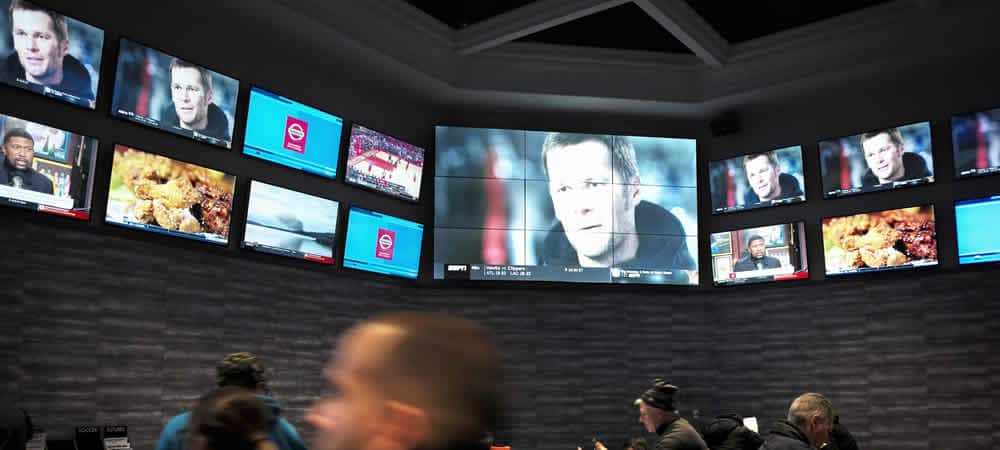- Four states are on the path to miss out on their original sports betting estimations.
- Mobile betting, which is active in only a few states, may be the missing ingredient.
- New Jersey and Nevada have cruised along, setting the tone for the sports betting market.
TALLAHASSEE, Fla. – Legal sports betting revenues have not been living up to expectations across the country as many of the state’s fiscal years are coming to a close.
Rhode Island, for example, projected to bring in $23.5 million over the course of the first wagering year, according to Paul Grimaldi, the Public Information Officer for Rhode Island Department Of Revenue.
However, it is currently sitting at less than 1% of those projections, with $150,000 being held in tax contributions since the late-November launch.
Rhode Island receives 51% of all sports betting revenue, so the questions shifts from are the sports bettors just doing well to is there a flaw in the system?
“The Super Bowl did hurt us tremendously,” said Representative William O’Brien (D – North Providence), after watching sportsbooks in Rhode Island lose just less than $1 million. However, February was just one month of the sports betting year and though most states lost money on Super Bowl bets, this cannot account for the vast difference in projections.
The popularity of the hobby is certainly there, as Rhode Island has seen their handle steadily increase over the first four months of operations. Reaching $20 million in total bets for February and just under the same figure in January, it may appear that gamblers in Rhode Island are just wiser than the rest.
But the same scenario that is happening in Rhode Island is also occurring in states like Pennsylvania, West Virginia, and Mississippi. Only New Jersey seems to be beating expected revenues.
One point of contention is that New Jersey has an up and running mobile betting industry, which has accounted for nearly 80% of the total handle in NJ for 2019.
West Virginia established their online betting platform; however, both of the operators suspended operations after a contract dispute with their technology provider.
“The only thing I’m frustrated with is I would have probably liked to bet March Madness from my iPhone,” said WV Senator Craig Blair (R – Berkeley).
With no plan for online action to resume anytime soon, West Virginia continues to miss out on valuable wagering opportunities provided by MLB’s Opening Day and the NCAA’s March Madness Tournament.
Their projections led residents and legislators to believe that $5.5 million could be earned for the state in the first year. However, they are currently sitting at $826,000 in state revenue from their September launch through the end of March.
Not all of the legislators believed the numbers would be met, as WV Senator Michael Romano (D – Harrison) knew from jump street that the 10% tax on legal sports betting revenue was too low.
For both Mississippi and Pennsylvania, they have accounted for half of their projections. Pennsylvania has approved mobile sports betting; however, they have not launched the industry yet.
Legislators are hoping that the launch will help meet expectations, as 34% of revenue is taxed back to the state. Furthermore, their licensing application fee is an astronomical $10 million, which has helped increase the numbers this year.
As for Mississippi, the state permits mobile wagering, but players must be physically located on-site to submit a wager. Though a measure was introduced to allow players to gamble from anywhere in the state, it died in committee, leaving off-site mobile wagering just a thought.
MS Senator Hob Bryan (D – Amory) believes the state is failing to meet projections due to two reasons.
The first is the simple fact that special interest groups increased the projected revenues to get other legislators on board. Furthermore, there is the belief that those legislators wanted the measures to pass and allowed the augmented numbers to get the residents on board with the plans.
Bryan, however, admits that it is still too early to tell if the revenue projections will hit or not.
In either case, the four states will have to catch up to states like New Jersey and Nevada that are in the same ballpark for total tax contributions. Taxed slightly more, New Jersey receives 8.5% of land-based wagering revenue and 13% of mobile-based wagering revenue.
With the influx of mobile betting in Pennsylvania, the newly-approved law permitting mobile wagering in Rhode Island, the potential for off-site mobile betting in Mississippi next year, and the likelihood that West Virginia will move past their online wagering disputes, it is assumed numbers will hit closer to projections.
Eight states have legal sports betting so far since the appeal of PASPA with another dozen expected to launch an industry before 2022. Hopefully, those states took a second look at their projected revenue numbers beforehand.
Advertising Disclosure
In order to provide you with the best independent sports betting news and content LegalSportsBetting.com may receive a commission from partners when you make a purchase through a link on our site.
News tags: Mississippi | New Jersey | Rhode Island | sports betting | sportsbooks | West Virginia

After spending time scouting college basketball for Florida State University under Leonard Hamilton and the University of Alabama under Anthony Grant, Michael started writing focused on NBA content. A graduate of both schools, he now covers legal sports betting bills, sports betting revenue data, tennis betting odds, and sportsbook reviews. Michael likes to play basketball, hike, and kayak when not glued to the TV watching midlevel tennis matches.



 College Football Betting
College Football Betting Best Online Sports Betting
Best Online Sports Betting Best Legal NFL Betting
Best Legal NFL Betting States With Legal Sports Betting
States With Legal Sports Betting Sports Betting Events
Sports Betting Events




